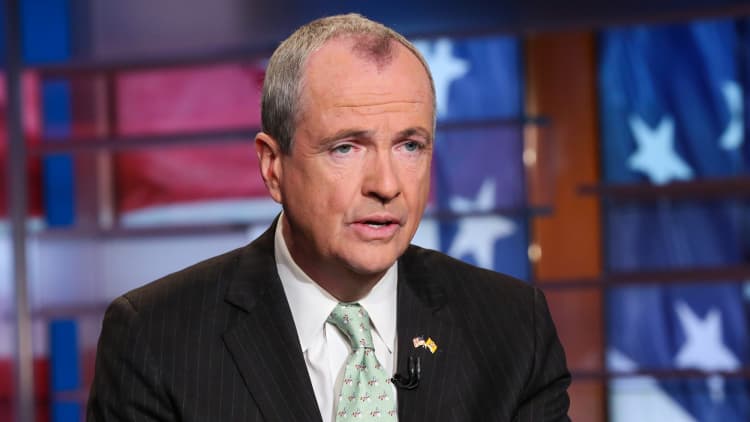
New Jersey is looking to allow more nonessential businesses such as barbers and restaurants to reopen with restrictions in a "matter of weeks," though no specific timeline has been set, Gov. Phil Murphy told CNBC on Thursday.
Indoor businesses where people interact closely such as hair salons and restaurants are more complicated, he said on CNBC's "Squawk Box."
"Outside's easier than inside, so the toughest nuts to crack are inside, no ventilation, sedentary," Murphy said. "That means indoor dining is going to be more complicated than outdoor dining."
Still, he added, "I am hopeful that with the progress we've been making that that's a matter of weeks" for barbershops, beauty salons and gyms to reopen.
He did not say what kind of restrictions, such as capacity limits, will be rolled out for such businesses when they can reopen. Some research endorsed by the White House has shown that the virus doesn't spread as easily outdoors and particularly in sunlight.
Every state has eased regulations meant to curb the spread of the coronavirus and reopened at least some nonessential businesses. However, states are moving at vastly different paces. Wisconsin reopened over night after the state's Supreme Court overruled the governor's orders.
New Jersey, which is the second hardest hit state in the country, has allowed nonessential retailers to reopen for curbside pickup and will allow beaches to open this weekend for the Memorial Day holiday. Most businesses, however, remain shuttered, with no official timeline for when they can expect to reopen.
"We chose to rip the Band-Aid off the economy, which has been extraordinarily painful for job loss, for small businesses, for many of our sectors," Murphy said. "But the alternative was to let the virus go, or in this case open up too early, in which case I think it's throwing gasoline on the fire, not just on the public health piece of this, but you also have a much deeper hole economically."
The coronavirus has infected more than 150,776 people across the state as of Thursday and killed at least 10,749 people, according to data compiled by Johns Hopkins University. Murphy said the state is well past its peak and indicators, which include new hospitalizations, intensive care unit capacity and available ventilators, have all moved in the "right direction now for more than a couple of weeks."
The state has ramped up its testing capacity and will be screening 20,000 people per day by the end of next week, Murphy added. More than 8.8 million people live in New Jersey, according to the U.S. Census Bureau. Public health specialists have emphasized the need to increase rapid, cheap and accurate testing in order to identify pockets of spread before they develop into full-on outbreaks.
"This is a delicate balance without question," he said. "We're as 'money ball' as we can be and we say all the time that data determines dates."
Epidemiologists around the country have warned that reopening nonessential businesses and lifting restrictions could lead to a gradual increase in infections as Americans begin to intermingle more. Some states, including Georgia and Texas, reopened before meeting guidelines laid out by the White House such as two weeks of declining new cases. Murphy said New Jersey is taking a cautious approach to prevent another outbreak from spiraling out of control and threatening to overwhelm the state's health systems.
"I want to open up as much as anybody, trust me," he said. "I want to get folks back to work as fast as possible, get small businesses back on their feet, but if we screw up the public health piece, none of that will happen."


